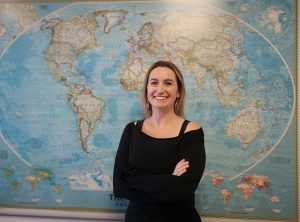UMH researcher receives 1.5 million euros from the EU to translate knowledge of diabetes to low-resource settings
Campus, Elche, Fuente, Investigación, Noticia, Others, Servicios UMH
30 January 2019
The European Research Council (ERC) has awarded a Starting Grant of 1,475,334 euros to Lucy Anne Parker, lecturer from the Department of Public Health, History of Science and Gynaecology at the Miguel Hernández University of Elche (UMH), to study diabetes prevention and management in low-resource settings. Her project, entitled Contextualizing Evidence for Action on Diabetes in low-resource settings: a mixed-methods case study in Quito and Esmeraldas, Ecuador (whose acronym is CEAD), is to last five years.
 This study falls within Pillar 1: Excellent Science of the ERC Framework Program, which strives to create new research groups based on the scientific excellence of research personnel and their projects. UMH researcher Lucy Anne Parker, member of group 26 of the Center for Biomedical Research in the Epidemiology and Public Health Network (CIBERESP) and coordinator of the university’s Interuniversity Masters in Development Cooperation, has led a health promotion project in Mozambique, and is an active collaborator with Médecins sans Frontières.
This study falls within Pillar 1: Excellent Science of the ERC Framework Program, which strives to create new research groups based on the scientific excellence of research personnel and their projects. UMH researcher Lucy Anne Parker, member of group 26 of the Center for Biomedical Research in the Epidemiology and Public Health Network (CIBERESP) and coordinator of the university’s Interuniversity Masters in Development Cooperation, has led a health promotion project in Mozambique, and is an active collaborator with Médecins sans Frontières.
The general objective of Parker’s new CEAD project is to examine the process by which global recommendations for preventing and treating diabetes can be translated into appropriate actions for countries and regions with low resources, places where the number of people with this disease is increasing. Considerable information exists about prevention of type 2 diabetes as well as the treatments that patients must follow to control it properly; however, they are not applied equally among all population groups. In particular, barriers to their correct application may exist in areas with limited health resources, and protocols tailored to the realities of such surroundings would be beneficial.
According to Parker, CEAD project outcomes will assist worldwide efforts to bridge the know-do gap. In other words, to advance from possessing medical knowledge to implementing viable health measures, which is itself one of this century’s most important public health challenges, and an opportunity to strengthen health systems and achieve health equity.
The research will be conducted in two carefully selected settings in Ecuador: a rural region of Esmeralda and a low-income neighborhood in the capital of Quito. The study will utilize mixed methods, combining quantitative epidemiological research and qualitative methodology, with the objective of generating rich and varied knowledge to trigger policy action and/or changes in care models. Moreover, patients, community members, health workers, and decision makers will be engaged in the process of generating, interpreting, and using the knowledge.
The International Diabetes Federation indicates that this disease affects some 8.5% of Ecuador’s population. Of those affected, 92% of the cases are type 2, which is preventable. Treating it costs 22,000 euros per patient per year, while preventing it reduces such costs to about 700 euros. According to the Ecuadorian National Institute of Statistics and Census, this pathology was the second leading cause of death in women and the third for men between 2016 and 2017.